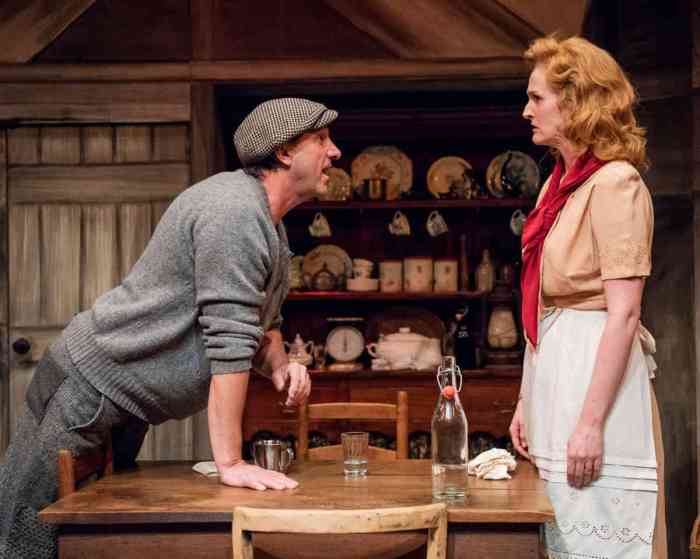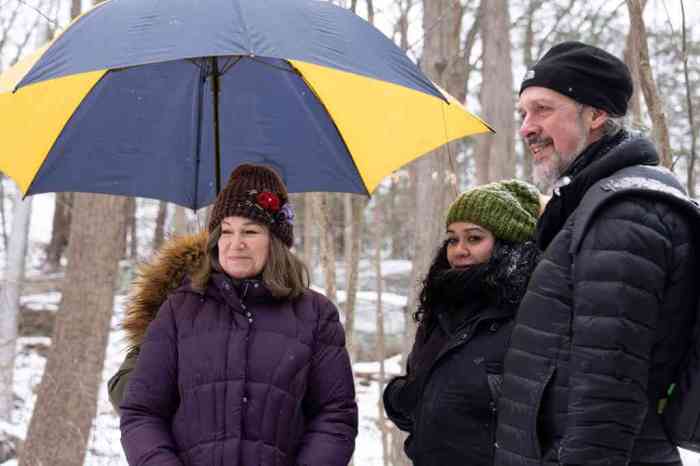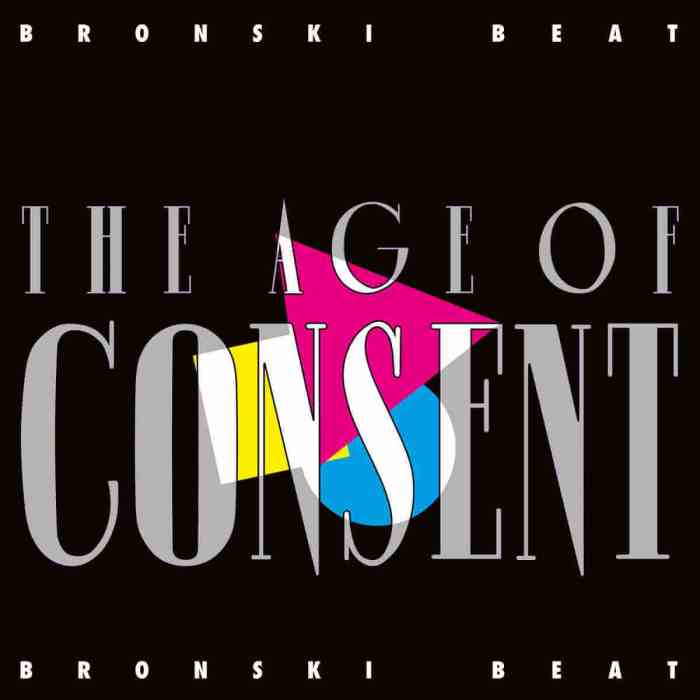LaChanze as Diva Donna, Ariana DeBose as the younger Disco Donna, and Storm Lever as Duckling Donna with the company of Colman Domingo, Robert Cary, and Des McAnuff’s “Summer: The Donna Summer Musical,” at the Lunt-Fontanne Theatre. | JOAN MARCUS
If you weren’t there, then you probably don’t know. The influence of Donna Summer’s music was both liberating and profound in discos from New York to Los Angeles — and especially places like sleepy Wilmington, Delaware, where underage, deeply closeted gay kids were able to sneak into the only gay disco for miles, mostly hidden on the second floor of an otherwise staid restaurant. It was in these clubs for a brief moment in the dozen years between Stonewall and AIDS that a culture of celebration and release took root on the dance floor. In a time when gay people could be freely discriminated against and abused, the disco was one of the only places to dim all the lights and express one’s identity freely and in community.
Donna Summer, like Gloria Gaynor before her, provided the soundtrack — and in many cases the inspiration — for that freedom. Gaynor’s defiant “I Will Survive” gave way to Summer’s “Love to Love You Baby,” which boldly and unabashedly promoted sex purely as hedonistic pleasure. At least in the disco, gay people could throw off the repressed and Puritanical straight world. When so many were forced to live in secret for their own protection, it wasn’t just a dance party. It was a kind of salvation.
The story of how all this came about and how Donna Summer emerged as the Queen of Disco, survived her own history of abuse, started a career, became a mega star, turned her back on her fans, seeking religion and a deeper meaning for herself, is the stuff of theater. Given the soundtrack, it’s the stuff of musicals.
The death of disco and the death of a matriarch fail to enliven two new shows
So it’s horribly disappointing, at the least, that “Summer: The Donna Summer Musical” is such an incoherent, soporific mess. The conceit is that we are at a last concert where stories will be told. Well, stories will be indicated. The shallow book by Colman Domingo (who abdicated his usually incisive ability to create characters to grind out this pablum), Robert Cary, and Des McAnuff follows the typical jukebox/ bio-show formula. Events are mentioned but never explored. We’re told things but not shown things, and Summer herself is reduced to a one-dimensional character, though played by three actresses. What we’re left with is a biography notable for its tiresome banality and a seemingly intentional resistance to looking at anything beneath the surface of the characters or events.
Worse, by sanding off any sharp edges, the producers make a play to downplay Summer’s controversial abandonment of her gay audience and some of the bad choices she made to present a more palatable image of the star. This makes the book read as false and manipulative and undermines every inherent dramatic conflict in the story. It might have been better had they just done a concert of the 23 songs in the playlist and left it at that. Then, they would have been able to do many of the full songs, rather than the truncated versions mostly seen here. Indeed, once the realization sets in, very quickly, that this is going to be a weak-kneed whitewash, the impulse during the book scenes was simply to shout out, “Oh, shut up and just sing.”
Fortunately, the singing is pretty good. The cast is led by LaChanze as Diva Donna, and her powerful, versatile voice can thrillingly recall Summer’s qualities. There are moments when she inspires goosebumps, and they are the show’s saving grace. Ariana DeBose as the younger Disco Donna has more of the heavy lifting book scenes to do, but she, too, captures most of Summer’s tones and has to negotiate the changes in style over her career. Storm Lever as Duckling Donna is not so successful. She has a powerful voice, but it’s mostly a contemporary belt. To be fair, there’s not much source material for her to work with, but her overall performance is generic, mannered, and dull. She could be any little girl from any sitcom from any era. The rest of the company does a professional job backing up these three with a lot of enthusiasm.
McAnuff has not so much directed as played traffic cop, though the scenes at times move with dizzying pace around Robert Brill’s projection-heavy set. Let’s just say that choreographer Sergio Trujillo has done much better in the past and leave it at that.
Of course, none of this may matter. “Summer” largely trades on the “Mamma Mia” effect, meaning that a large percentage of the audience for this show for the most part couldn’t really care less about theater or storytelling, certainly at the performance I saw. They just want to go to the souvenir stand and dance in their seats. “Summer,” then is not so much a piece of theater as an attraction. It’s very much like watching a preschool class dance to the Village People singing “YMCA.” It’s got a good beat, and you can dance to it. Just ignore anything else if you don’t want to be overcome by irony. Thus, four decades on, the social and political importance of an era can be jettisoned for easy entertainment. This is, after all show business. Just don’t pretend it’s theater.
Near the end of “Sweeney Todd,” the murderous pie shop proprietress Mrs. Lovett is confronted by the still living body of the Beggar Woman whose throat Sweeney has just slit. Mrs. Lovett looks down at the suffering woman and screams, “Die! Die! God in Heaven, die!”
That’s pretty much how I felt watching the rambling, unformed, even ghastly “Peace for Mary Frances” at the New Group. And it’s not just me. The title character spends half the play talking about how much she wishes she would just expire already. In fact, over a ponderously long two-and-a-half hours, Mary Frances keeps asking, “Why is this taking so long?”
Lois Smith, J. Smith-Cameron, and Paul Lazar in Lily Thorne’s “Peace for Mary Frances,” directed by Lila Neugebauer, at the Alice Griffin Jewel Box Theatre through June 17. | MONIQUE CARBONI
The answer rests in Lily Thorne’s tale of a family in turmoil as the matriarch goes into hospice care and long-simmering resentments and recriminations come to the surface. It’s not that the subject matter isn’t fodder for compelling theater — “August, Osage County,” for one, leaps to mind. It’s that Thorne has no idea how to build characters, craft a scene, or introduce any kind of complexity into the situation. This is incessant, flat out exposition, with emotional eruptions, that leaves us nowhere, provides no original insights into the human condition, or goes any further than positing that families can be rotten to one another at times of high stress. Combined with Thorne’s forced and inauthentic dialogue, the result is shallowness usually reserved for sidewalk puddles — or the Donna Summer musical.
This is rendered all the more tooth-gnashingly enervating when one considers that this has been directed by the usually incisive Lila Neugebauer and includes a marvelously talented cast, each of whom does what they can with what little they have to work with. Lois Smith is the dying matriarch, and she’s always wonderful, though elements of her character are incongruous, such as how can someone days away from death from COPD leap from bed, run to the window, and raise it to shout into the yard?
I would pay to watch Johanna Day or J. Smith-Cameron eat soup — they’re that wonderful as actresses. Sadly, that would be a whole lot more interesting than what they get to do here. Day plays a recovering addict who is nonetheless mom’s favorite, and Smith-Cameron plays her sister, a perpetually pouting, passive-aggressive, manipulative astrologist who wants her mother’s love — and more than her share of the inheritance. The script constrains them from giving anything other than one-note performances. There are also two venal granddaughters who are, consistent with the family, completely self-involved and dull with several pointless scenes that dilute the focus of the play even further.
It’s not enough that Thorne taps into topics that have a universality — family dysfunction, dealing with aged and dying parents, unresolved pass issues — she has nothing original to say about them. They’re just another awful group of people. A hospice worker says that the family isn’t the worst he’s encountered. But they’re close.
SUMMER: THE DONNA SUMMER MUSICAL | Lunt-Fontanne Theatre, 205 W. 46th St. | Tue.-Thu. at 7 p.m.; Fri.-Sat. at 8 p.m.; Wed., Sat. at 2 p.m.; Sun. at 3 p.m. | $48-$179 at ticketmaster.com or 800-653-8000 | One hr., 40 mins., no intermission
PEACE FOR MARY FRANCES | Alice Griffin Jewel Box Theatre, 480 W. 42nd St. | Through Jun. 17: Tue.-Fri. at 7:30 p.m.; Sat. at 8 p.m.; Sat.-Sun. at 2 p.m. | $25-$100 at ticketcentral.com | Two hrs., 30 mins., with intermission




































